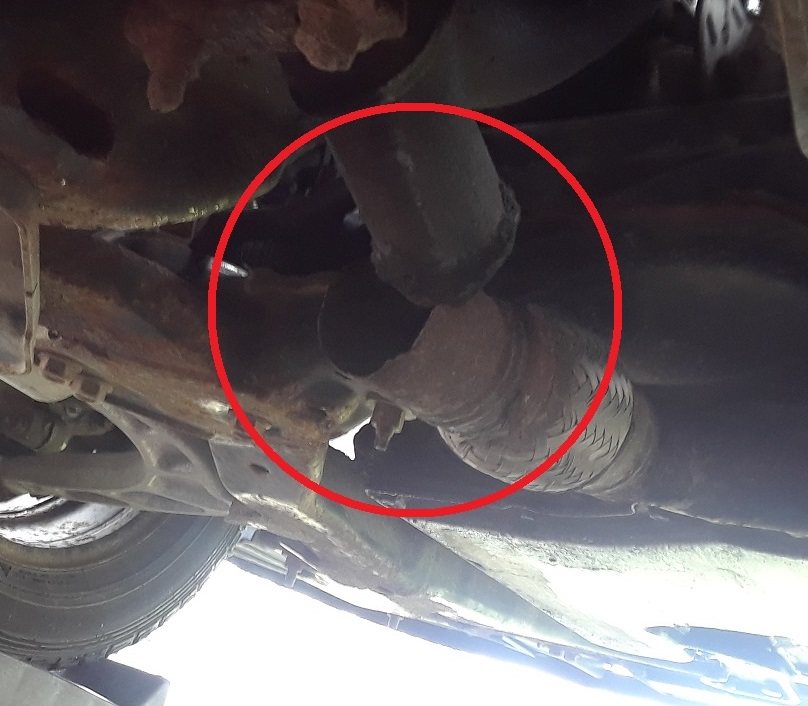A car's exhaust pipe has two crucial functions. It helps remove exhaust gases and reduce the noise from the engine. Part of the exhaust is also customisable, such as with exhaust tailpipe chrome tips.
A cracked exhaust pipe can be a problem. The vehicle will still be drivable, but you could be fined heavily if caught driving one. A cracked exhaust pipe lets gas escape the system prematurely, causing loud noises and even gas leaking into the vehicle cabin.
Read this guide to understand cracked exhaust pipes and why you shouldn’t drive if you have one. Know the signs to look out for when you suspect you have a cracked exhaust pipe.
Can I Drive a Car with a Cracked Exhaust Pipe?
Yes, from a technical standpoint, your car will still be drivable even if it has a cracked exhaust pipe. However, it's best to wait until you have fixed the problem.
Remember that your car’s exhaust system serves these purposes:
- Remove harmful exhaust gases from the engine and let them out behind the vehicle, away from the engine compartment and cabin where the occupants are.
- Minimise the noise from the engine due to the internal combustion process.
- Improve engine performance and fuel consumption.
You can’t expect the car’s exhaust system to function correctly if it has one or more cracks in its pipes. When that happens, harmful exhaust gases will pool underneath your vehicle and potentially enter the cabin where you and your passengers sit.
That poses a serious health risk, not to mention that it will make you incredibly uncomfortable inside your vehicle.
The cracks will let loud engine noises escape into the air, disturbing other people.
Now, if you’re not bothered by those outcomes and still insist on driving your car with a cracked exhaust pipe, remember that laws govern these things, and you run the risk of getting heavy fines.
What you should do is bring your car to your preferred workshop to investigate the noise from your exhaust system. If it’s a cracked pipe, it’s best to have a tow truck take your car to the mechanic.
What Causes Cracks in an Exhaust Pipe?
Whatever the make or model of an ICE vehicle, it has an exposed exhaust pipe because the whole exhaust system is mounted underneath the vehicle, placing it just inches above the ground.
So, the first reason your exhaust pipe gets cracked is due to impact. Rocks and other hard objects can bounce off the road and hit the exhaust pipe or exhaust tailpipe extension, causing dents, holes, and cracks.
Besides that, cracks can also result from thermal stress. The exhaust gases flowing out of your engine are hot, instantly raising the temperature of your exhaust pipe. If the pipe were to cool down suddenly for any reason, that could stress the material and cause it to crack.
Lastly, remember that your car’s exhaust isn’t one continuous piece of piping. Instead, several components, like the catalytic converter, muffler, and piping sections, are connected using bolts and studs.
The crack causing your exhaust system problems might not be at the pipe's body but at the ends connecting to other system sections.
How Do I Know If My Exhaust Pipe Is Cracked?
Whenever your engine’s exhaust gases escape the system before reaching the tailpipe, that’s an exhaust leak problem, which can include a cracked exhaust pipe.
Here are a few symptoms that let you know you’ve got an exhaust leak:
- Noise: The first and most obvious sign of an exhaust leak is the loud noise. Under normal conditions, the noise caused by exhaust gases is contained within the exhaust system. However, a large crack could let out a lot of that noise.
- Smell: Aside from the noise, you will also notice the smell of exhaust gases even from the driver's seat. That's because the leaking exhaust gases pool underneath the vehicle when it's stationary. As a result, the gases will rise, and some will enter the cabin. Exhaust gases can pose health issues, so you and your passengers might feel ill.
- Vibrations: Excessive vibrations, particularly from the accelerator pedal, are also a sign that you have a cracked exhaust pipe. Air must flow in and out of your engine smoothly to function normally. However, an exhaust leak undermines the outgoing airflow and causes vibrations.
- Fuel efficiency: Minor exhaust leaks might not cause the symptoms mentioned above, but over time, you might notice a drop in your car’s fuel efficiency. In other words, your engine doesn’t burn fuel as efficiently when there’s an exhaust leak, increasing fuel consumption.
Does Exhaust Pipe Size Affect Performance?
There are several ways to repair a cracked exhaust pipe. In some cases, you may replace the cracked section of piping entirely.
Exhaust pipes come in different shapes and sizes, and you can get a flexible exhaust pipe if you want one. Whichever one you choose, make sure it's the same size. That's because the exhaust pipe size affects your engine's performance.
An undersized exhaust pipe can reduce your engine’s performance and fuel efficiency because it limits the engine from removing exhaust gases fast enough.
Conversely, an exhaust pipe that’s too large is also bad for the engine. An oversized pipe will make the engine work extra hard to get exhaust gases out, adding stress on the engine and burning more fuel.
Final Thoughts
The gases from the engine must travel the entire length of the system until it leaves through the exhaust tailpipe. Exhaust pipe cracks or anything that allows the gas to escape before that point will undermine the overall exhaust system and the engine’s performance.
So, if you suspect a crack along your car’s exhaust system, bring your car to a reliable workshop right away for proper diagnostics and repair.
You can use the Directory at CarpartAU to find workshops in your local area that can help you out. Contact them now!
By Ray Hasbollah

